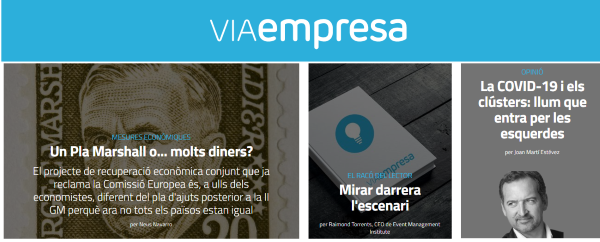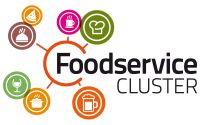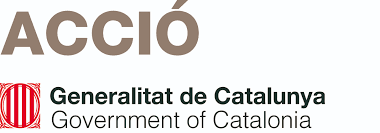Catalan clusters mobilized against COVID-19
Catalonia has been hit hard by the coronavirus crisis. ACCIÓ, the Catalan Agency for Business Competitiveness, has set up two main initiatives: a Virtual Desk that acts as a single contact point for companies and freelancers to solve any covid-19 query and a Marketplace to connect companies offering and looking for technology or health related solutions related to the crisis in which over 1.500 companies have already participated.
As Joan Martí, Director of the Cluster Unit at ACCIÓ mentions in the article “Clusters: light between the cracks” published on 21 April 2020 in the online economic magazine viaempresa.cat, the main recipes to face the COVID-19 crisis (international cooperation, collective intelligence, focus on challenge, multidisciplinary teams…) are also the main features of cluster policy. Catalonia started working with clusters as a tool almost 30 years ago to face a crisis in the manufacturing industries, having demonstrated their capacity for change. Today there are 30 clusters in the Catalonia Clusters Programme involving more than 2600 companies generating 30% of the region's GDP.

The Catalan clusters have been very active since the beginning of the crisis. Some of them immediately launched a series of joint webinars for companies providing them with relevant information and resources.
Moreover, there are already eleven clusters leading or coordinating COVID-19 related initiatives.
A first group of initiatives aim at providing technology or health-related products and solutions:
- The Advanced Materials Cluster coordinates over 50 companies having more than 120 3D printing equipment. The cluster has articulated proposals activating different parts of the value chain, for example, a single company has donated authorised and certified as biocompatible ABS material to manufacture filaments for 3D Printing. ABS is a good PLA substitute (internationally and massively used material by makers thus scarce) after adjusting some printing parameters.
- Secpho, the Light Technologies Cluster gathers photonic technologies useful to carry out quick and precise virus diagnosis. For example, infrared thermography allows generating a skin thermal map in real time through a camera having infrared sensors. Computer vision, using a combination of an infrared image gallery and a behaviour study, could be used in high-traffic areas without citizens having to go through a given check point.
- CICAT, the Lighting Cluster coordinates the participation of 7 manufacturers in a project aimed to design and manufacture a respirator. One company oversees the design of an open source platform while seven others are manufacturing different components (circuits, dimmers, power sources...).
- Modacc, the Catalan Fashion Cluster is identifying capabilities among their members to redirect manufacturing activity towards the manufacturing of masks and hospital gowns.
- Cenfim, the Home & Contract furnishings cluster is collaborating in a local project in Terres de l’Ebre consisting in manufacturing methacrylate boxes to be used as a protection against covid-19 by healthcare workers.
- The Beauty Cluster Barcelona launched a Marketplace to connect supply and demand, namely of hydroalcoholic gels. Several companies have adapted their production to manufacture such products.

A second group of initiatives are related with the confinement situation:
- The Mental Health Cluster is coordinating a consortium of 4 companies aimed at improving mental health and wellbeing of students staying in halls of residence. The consortium is led by a group managing the biggest network of halls of residence in Spain and aims at improving the mental health of young people (10%-20% suffering from mental disorders). The project offers specialised training to directors of the halls of residence to alleviate depression, isolation, or substance abuse of the students. These conditions are experiencing a higher impact due to the covid-19 in students confined in these spaces. The training will be given by specialists of the sector and coordinated by two cluster members while another company will build the platform. Beyond the training, an emergency “red button” will be launched for extreme cases.
- Railgrup, the Railway mobility cluster is strengthening the sector’s capabilities in cybersecurity. Railgrup is carrying out a series of specialised seminars on prevention, early detection, response and recovery in relation to cyberattacks likely to affect railway operations.
- Edutech cluster is becoming an amplifier of the initiatives being implemented in the technology- educational sector to suport schools and families in the framework of the covid-19. The cluster offers an online portfolio of technology solutions for teachers which will allow more students to follow their learning process from home. Also, the recently published “Digitalisation Framework” report will be useful to suport schools and other educational centres to reflect, identify and improve innovation in education.
- The Kid’s Cluster has launched the campaign #Juguemenfamília ('let’s play with family') to bring educational games closer to the families in this period. It is a platform gathering leisure and educational resources in which over 20 cluster members have already offered their assets like English lessons, or games and experiments provided by the collaboration of two companies. The platform is also fostering networking and business opportunities among members.

Last but not least some initiatives are looking ahead to reactivate private consumption. In this sense, the Foodservice cluster joined a renowned online restaurant reservation engine to promote the campaign “Let’s save our restaurants”. The campaign encourages customers to buy pre-paid vouchers for restaurants to be used once the confinement is over, thus contributing to the restaurants’ cashflows.

Despite the crisis and the lean structure of cluster organisations, clusters prove once again to be resilient organisations with a very high capacity to mobilise resources and to constantly adapt. And this is a key asset in an ever-changing environment. Catalan clusters are a great example to follow.
For more information please contact Emma Vendrell, Head of International Projects, Clusters Unit, ACCIÓ at emma.vendrell [at] gencat.cat.
